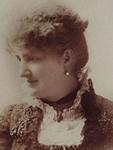Authors > Marietta Holley

Marietta Holley
Sex: Female
Country: AmericanBirth & Death: 1836-1926
Marietta Holley (1836-1926), was an American humorist who used satire to comment on U.S. society and politics. Holley was frequently compared to Mark Twain and Edgar Nye.
Holley was born on to John Milton and Mary Tabor on July 16, 1836. She was the youngest of seven children. They lived on a small farm in Jefferson County, NY. At the age of 14, she ended her formal education to make a decent living and help support her family by giving piano lessons to students. When she was 17, she converted to baptists and joined the Adams Village Baptist Church. Her father died when she was 25, and Holley took charge of the farm and care of her sick mother and sister. After she became successful as a writer from her novels, she built a mansion called "Bonnie View" near her family's home in Pierrepont. Holley never married. She died on March 1, 1926 at the age of 89.
Holley enjoyed a prolific writing career, and was a bestselling author in the late 19th-century, though she was widely forgotten by the time of her death. Her first poems were published locally in the Adams Journal, which lead to later successes in more prominent periodicals, such as Peterson's Magazine. In 1872, her first novel, My Opinions and Betsey Bobbet's, was released by the American Publishing Company. In total, Holley wrote over 25 books, including one collection of poems, two dramas and one long poem between 1873 and 1914. Included in her works was a series of ten books that revolved around a character named Samantha and her husband Josiah Allen as they journey outside of Samantha's rural hometown, similar to her home in Jefferson County, NY. Holley spent most of her life close to her family's farm, rarely leaving. Aside from Saratoga and Coney Island, Holley never actually visited the places she wrote about in her Samantha series. She depended on maps, guidebooks and descriptions and to write her narratives based on the learned knowledge.
Many of Holley’s writings share the common themes of women’s rights and prohibition. She was well regarded by many contemporary writers and suffragists. Her famous friends included Susan B. Anthony, Twain and Clara Barton. Anthony frequently asked Holley to give speeches at suffrage conventions due to the strong stand Holley took in support of women's suffrage, though Holley refused public appearances.
Holley is remembered as one of America's most significant early women humorists, along with Frances Miriam Whitcher and Ann S. Stephens.
Comment:
- Information Loading...
Your Comment: